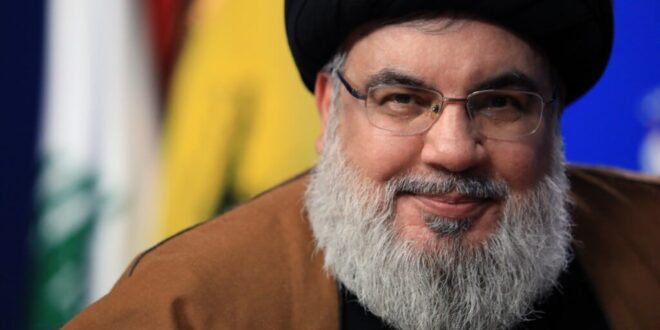Hezbollah chief Hassan Nasrallah has miscalculated, and in the process dragged Lebanon into a bloodbath that the already impoverished, isolated, and desperate Lebanese can ill afford. The world is trying to help him save face, although first he must agree to many concessions before Israel lets him off the hook. But what brought him here?
Nasrallah fell into the classic trap of an undisputed leader who lives alone and surrounds himself with yes men. Since 2006, he has rarely been seen in public. Those who get to meet him are taken, blindfolded, through a maze of security measures that lead to the militia chief.
Detachment from the general population, coupled with a personality cult that Nasrallah has so carefully cultivated over the past two decades, limited his awareness of reality. When justifying his “war in support of Gaza,” the Hezbollah chief did not measure cost and effect. He simply justified going to war by saying that, on the Day of Reckoning, “the Almighty will ask each one of us what did you do to help Gaza?” Mixing faith with reason is hardly a recipe for success.
Nasrallah then started believing his own propaganda, that Israel was weak, that his militia was invincible, so much so that – in one speech – he threatened to attack Cyprus, a member of the EU.
Israel, however, was not on its last legs. Its economy was not in tatters. Its population was not decadent and unwilling to fight for the homeland, or shrinking due to emigration. Only hit pieces in “resistance axis” media underestimated Israel’s strength and resilience.
The “axis of resistance” overestimated its own power. Missiles are not new. Saddam Hussein produced hundreds of Al-Hussein and Al-Abbas ballistic missiles and threw up to 40 of them at Tel Aviv. While they are a threat, especially to civilians, these weapons cannot annihilate Israel or any other country, nor can the wedding photography drones that Hezbollah and Iraqi militias launch on Israel with a small load of explosives.
Among the axis, its leader Iran understood the limitation of its military. In the two instances that it launched missiles at an American base in Iraq and on Israel, Tehran choreographed the attack carefully and made it known that it was a one-off event designed to save face.
The Houthis in Yemen, too, realized that Israel was capable of hurting them much more than they could inflict damage on Israel. Since their drone killed an Israeli and almost cost them control of the port of Hodeidah, the Houthis have launched only one ballistic missile, which the “axis of resistance” spent a week praising and analyzing how it presumably “changed the course of the war.”
Only Hamas’s Yahya Sinwar and Nasrallah did not understand that “the unity of the fronts” was more wishful thinking than reality. Iran never came to the rescue of Hamas or Hezbollah. These proxies were designed to fight and die for Iran to secure its interests on the cheap, not to drag it into costly direct wars.
Last but not least, Israel’s failures on Oct. 7 might have convinced Nasrallah of its weakness It took the Israelis up to 72 hours to push Hamas fighters out of the villages that they had raided and ravaged, and to wither down the waves of Hamas that continued to push into Israeli territory. On Oct. 8, when Israel looked at its weakest, Nasrallah launched his war.
Israel’s focus on Gaza in the south limited its response to Hezbollah in the north, and made Nasrallah believe that he had set the tone and tempo of what he called “the rules of engagement.” Nasrallah believed he had waged a low intensity war that he could afford, and that would allow him to set the conditions for how it ends.
But when Israel was done with Hamas, it shifted its military weight northward and started running circles around Hezbollah, which stood helpless and suffered heavy blows. To make up for his humiliation, Nasrallah’s propaganda started celebrating that its rockets were activating Israel’s sirens and Iron Dome defenses and sending Israelis to shelters. Hezbollah might have retained its big guns, its long-range precision guided missiles. But these have not been tested yet, and — judging by its performance so far — Israel might take another rabbit out of its hat and surprise Hezbollah by sidelining their effect.
To justify the miscalculation, both Khamenei and Nasrallah said that, had it not been for American power and support, their axis would have decimated Israel. How much of Israel’s strength comes from within and how much from foreign support is debatable, but irrelevant to anyone who is planning to wage war on Israel. War plans cannot be built on “what if” America did not support Israel.
Had Lebanon been free, and Hezbollah’s war and peace policies open for debate, Nasrallah could have read these lines before taking the country to hell. But when dissenting Lebanese voices are accused of treason and perceived as “part of the enemy’s psychological war,” Nasrallah’s ability to discern fact from fiction becomes impaired and Lebanon plunges into the abyss.
 Eurasia Press & News
Eurasia Press & News




